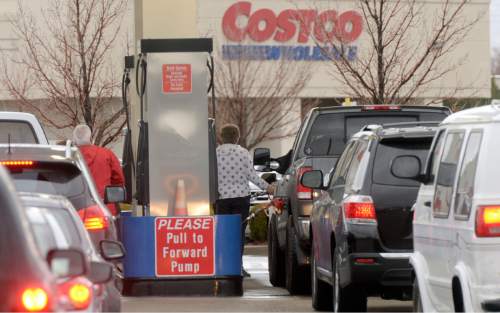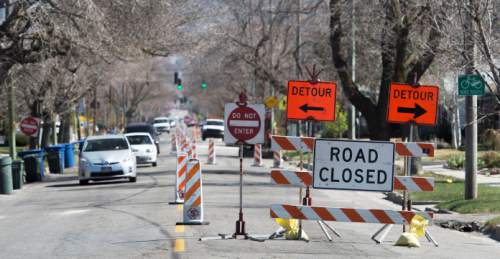This is an archived article that was published on sltrib.com in 2016, and information in the article may be outdated. It is provided only for personal research purposes and may not be reprinted.
When the Legislature raised the state gasoline tax last year by about a nickel a gallon, cities and counties were promised it would boost their share of that revenue about 17.5 percent this year — bringing tens of millions of extra dollars.
Many now say they are being shortchanged because of changes in distribution formulas — and some say it is leading them to raise local property taxes. Cities and counties are negotiating possible fixes, and hope that Gov. Gary Herbert calls a special legislative session to address it in October.
"We lost $71,215" from what was expected this year, said Midvale Mayor JoAnn Seghini, adding that is a significant amount for her city of 33,000. She said that is among pressures forcing Midvale to more than double its property tax this year.
Last year's HB362, which allowed the first Utah gas tax increase in 19 years, also allowed counties to hold votes on Proposition 1 to raise taxes for local roads and transit. Seghini said cities like hers also hoped Prop 1 would help solve long-festering problems from dwindling gas taxes.
"My city [residents] voted for it, but Salt Lake County [voters] didn't because they hate UTA [the Utah Transit Authority]," so it failed, she said. "We would have received $541,000 from it."
She adds, "The loss of both of those impacted our ability to have a sustainable budget without a property tax increase."
Other cities face worse problems, Seghini said, because they "looked at the final legislation and the money they'd be getting, and they issued contracts" for road work based on what they were told they could expect.
The Utah League of Cities and Towns (ULCT) says cities are being shortchanged by some $8.5 million because of tinkering with distribution formulas for the "Class B&C Road Fund," or the local share of state gasoline taxes, to help some small rural counties.
Retiring Rep. Johnny Anderson, R-Taylorsville, who sponsored HB362 in 2015, said it changed distribution formulas based on calculations proposed and worked out by the ULCT and the Association of Counties.
"The calculations didn't come out the way that they had hoped, so we made another adjustment to it in 2016," he said.
Anderson said the additional change through HB60 this year was made to help small-population rural counties that had not received any gas-tax money increases in years, and again would not have received any without some tweaks. But those counties have a large number of lane miles to maintain that benefit all state residents.
Even though the change was based on calculations proposed by the groups representing counties and cities, he said, "That flipped things the other way."
In fact, 11 rural counties and one town "would see increases of about 82 percent" instead of the once-promised 17.5 percent, said Cameron Diehl, an attorney for the ULCT. He said the formula cuts the gas-tax share of urban cities and towns.
"We're just trying to figure out a way to shift some of it back," said Lincoln Shurtz, a lobbyist for the Utah Association of Counties.
Diehl and Shurtz said their groups have been negotiating for months on more changes to finally find the right balance. They hope to present final calculations to their members next month, and hope for a possible special session in October to make needed fixes.
"It's taken a few tries to nail it down" and get calculations correct, Anderson said.
Anderson adds the overall gas-tax fund has a bit more money than expected this year, which may help make ends meet now as long-term solutions are hammered out.
"Because gas is so cheap, people have been driving more. So there's more money in that B&C road fund than what had been expected. So there's a little bit of extra money to make sure that the cities are made almost whole," he said.
Creating more pressure for a political solution is that the state temporarily halted the final of six periodic payments this year that distributes money to cities and counties from the B&C Road Fund.
House Speaker Greg Hughes and Senate President Wayne Niederhauser asked the Utah Department of Transportation to delay that distribution as a solution is worked out that could affect that final payment.
Seghini said that delay is hurting her city, too.
"We can't do anything until we know if we're going to get money" and how much, she said. "It puts us all behind" as the summer road-work season ends.







